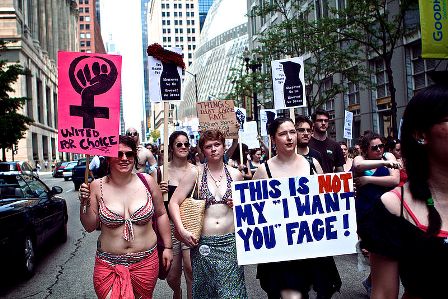common rape myths we’re all sick of hearing
**Trigger warning** Discussion of rape and sexual assault
Rape myths are harmful. Not only can they seep into a society’s collective cultural consciousness but they can seep into law and policy too. Moreover, instead of holding a rapist to account, myths about rape seek to, in some way, hold a victim of rape to account by inciting that rape was somehow “their fault”.
Recently, Cee Lo Green came out on twitter with a barrage of comments regarding his complete and utter confusion and misconception of rape. The tweets came just after Cee Lo was found not guilty, due to lack of evidence, in a sexual assault case. In light of this here is a comprehensive (but by no means exhaustive) list of common rape myths.
1. Cee Lo Green’s claim that people who are raped need to be conscious because they are only raped if they remember being raped.
No, no, no, hunny. You see rape is tied to the act of consent and a person accepting a drink laced with ecstasy and maybe even giving you the old raised-eyebrow-and-half-smile look is not consent for sex. Obviously people need to be conscious to consent to sex. If someone is unconscious you are not only violating them but you may be causing serious psychological damage to a victim who may well endure a lifetime of trauma and pain from your selfish, illegal act.
2. You are most likely to get raped by a stranger.
Wrong! In Australia just over two-thirds of assailants (68%) were know to the victim of rape and only 15% of those sexually assaulted reported sexual assault to police
3. Only young and attractive women are raped.
Many psychologists agree that rape is an act of violence, power, and aggression, and not just sex, so “attractiveness” has little to do with who is raped. Rape transcends matters of sexuality, race, social class, or religion.
4. Only a certain type of man rapes.
Rape can hinder men too. Myths about who rapes can be harmful to society. By stereotyping rapists we mythologise a rapist. A rapist cannot be archetypes of social class, religion, sexuality or race either.
5. Man rapes; woman is victim.
This one is most definitely a myth. Rape can be acted out by anyone, not just men, but sexual assault and sexual violence is largely perpetrated by men (93% are male)
6. Once she says yes she can’t back down.
This myth needs to be very importantly cleared up. A person has a right to say no to sexual acts at any point! Even during sex! If a person is in a relationship with someone, rape and assault can still occur. If a person is a sex worker, she can still be raped. Previous relations do not mean automatic consent to future sex. Consent is always needed from all parties.
7. Rape requires force by the raper and physical resistance by the victim.
In her essay, Without Consent: Confronting Adult Sexual Violence, Dr Patricia Weiser Easteal notes that ‘many forms of covert coercion and force may be used in rape,’ that aren’t physically violent. It is usually a victim’s fear that renders them passive and this is usually a survival response to rape. Moreover, Dr Patricia Weiser Easteal notes that a victim’s passivity is still held against her by Australia’s criminal justice system which, in many cases still links sexual assault with physical force and injuries.
8. Secretly women want to be raped.
Rape is frightening. Rape is traumatising. Rape victims are powerless. Women fantasising about aggressive sex have control within their experience. That is not rape. No one wants to be raped.
9. Her skirt was short/she was a sex worker/she was drunk/she was flirting/she asked for it.
Using a woman’s appearance, work, state of mind, lifestyle, or implications as a justification for sex is rape! It implies that women are to blame for being raped and it casts rapists in victim positions. If consent is not given, or if judgment is impaired, it is rape.
10. Rape can be prevented by the victim.
A victim cannot prevent a rape. A rapist can prevent rape. The truth is that rape prevention lies in societal change. Rape should be as socially and culturally stigmatised as cannibalism, and this can only be done in a society far removed from patriarchy.


